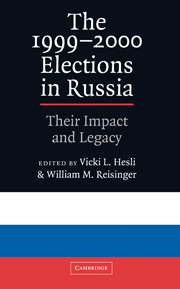Book contents
- Frontmatter
- Contents
- Contributors
- Acknowledgment
- SECTION I INTRODUCTION
- SECTION II PARTIES IN THE ELECTORATE
- 2 Television, Voters, and the Development of the “Broadcast Party”
- 3 Parties, Voters, and Foreign Policy
- 4 The Foreign Policy Implications of the Elections
- 5 Parties, Leaders, and Voters in the Parliamentary Election
- SECTION III THE ROLE OF REGIONAL POWER
- SECTION IV PARTIES AND INSTITUTIONS
- SECTION V CONCLUSION
- Bibliography
- Index
3 - Parties, Voters, and Foreign Policy
Published online by Cambridge University Press: 23 October 2009
- Frontmatter
- Contents
- Contributors
- Acknowledgment
- SECTION I INTRODUCTION
- SECTION II PARTIES IN THE ELECTORATE
- 2 Television, Voters, and the Development of the “Broadcast Party”
- 3 Parties, Voters, and Foreign Policy
- 4 The Foreign Policy Implications of the Elections
- 5 Parties, Leaders, and Voters in the Parliamentary Election
- SECTION III THE ROLE OF REGIONAL POWER
- SECTION IV PARTIES AND INSTITUTIONS
- SECTION V CONCLUSION
- Bibliography
- Index
Summary
For Russians, it was not only their state that collapsed in 1991. It was also their international environment. It had begun to give way at least two years earlier, in 1989, when Mikhail Gorbachev made clear that the Soviet government would not intervene to prevent the election of non-Communist governments throughout Eastern Europe. Speaking to the Central Committee in December 1989, Gorbachev professed to welcome the “positive changes” that were taking place in the region, presenting them as a further stage in the “renewal of socialism” (Materialy 1989, 18–19). But in any case, he asked the 28th Party Congress in the summer of the following year, what was the alternative? “Tanks again?” (XXVIII s"ezd 1990). The international organizations that had held these states together collapsed during 1991, when the Council for Mutual Economic Assistance (Comecon) and the Warsaw Treaty Organization agreed to dissolve themselves. When Gorbachev resigned as USSR President on Christmas Day at the end of that year, he was the last Communist leader in Europe.
The Russian Federation, with the agreement of the other post-Soviet republics, was the USSR's successor state: it acceded to the USSR's 15,000 treaties, to its international debt, and to its seats in the United Nations and within its Security Council. But it was scarcely a geopolitical successor. Post-Communist Russia was still the world's largest state, but it was only three-quarters of the territorial extent of the USSR. Its population was only half as numerous.
- Type
- Chapter
- Information
- The 1999–2000 Elections in RussiaTheir Impact and Legacy, pp. 51 - 72Publisher: Cambridge University PressPrint publication year: 2003
- 1
- Cited by



